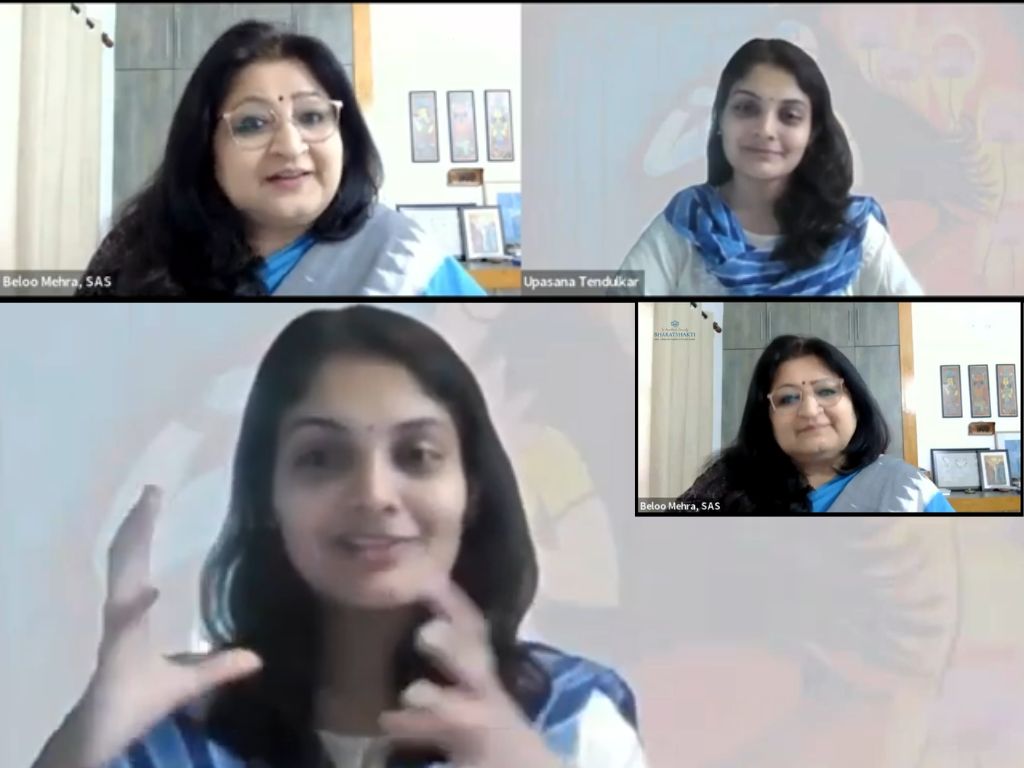Date: June 26, 2025
Venue: Online
Watch the Recording
Since September 2024, BhāratShakti department has been engaged in a year-long exploration of Spirit and Forms of Indian Art, both through the offerings in our online journal Renaissance, as well as various offline and online events we have been organizing and conducting. As part of this project, Dr. Beloo Mehra invited Ms. Upasana Tendulkar for a conversation to explore the contemporary relevance of Natyashastra, a foundational text of Indian Aesthetic tradition.
This was the second session focusing specifically on Natyashastra which BharatShakti department conducted under its Insightful Conversations project. The earlier session with Dr. Mala Kapadia focused on exploring human psychology through Natyashastra.
About our guest speaker:
Ms. Tendulkar is a multifaceted professional and a life-long student of dance. As the founder of Dancing Tales, she seamlessly integrates dance and movement into various disciplines, from classrooms to corporate boardrooms, enriching learning experiences with timeless wisdom from the Natyashastra.
With a lifelong devotion to dance and a profound understanding of its power, Upasana is on a mission to simplify lives across society using the wisdom of Natyashastra. With a gift for infusing movements with profound meaning, her expertise lies in recognizing patterns across diverse fields and weaving them into a harmonious tapestry. She has a Visarad certification in BharatNatyam and also an MBA from Cardiff Business School, and blends her love for dance and her professional preparation beautifully through her work in areas of corporate consulting, education, and community engagement.

Summary of the Conversation
Speaking of the deeper vision guiding ancient Indian theatrical tradition — of which Natyashastra is the foundational text, — Sri Aurobindo once wrote:
“The Hindu drama….was written by men of accomplished culture for an educated, often a courtly audience and with an eye to an elaborate and well-understood system of poetics. The vital law governing Hindu poetics is that it does not seek to represent life and character primarily or for their own sake; its aim is fundamentally aesthetic, by the delicate & harmonious rendering of passion to awaken the aesthetic sense of the onlooker and gratify it by moving or subtly observed pictures of human feeling; it did not attempt to seize a man’s spirit by the hair and drag it out into a storm of horror & pity & fear and return it to him drenched, beaten and shuddering.” (CWSA, 1: 191-192)
Inspired by this insight, this conversation with Upasana Tendulkar explored several topics relevant to contemporary society. The focus was to examine how Indian aesthetic vision, particularly insights from Natyashastra, can help us rethink ways to address some of the current challenges with regard to education, influence of mass media, individual and collective well-being, and help us create a more harmonious life – within and without.
The conversation also explored a bit about Ms. Tendulkar’s journey as a dancer and her studies of Natyashastra. We also talked about some of her experiences of incorporating dance and movement in different types of learning experiences that she curates through Dancing Tales. Ms. Tendulkar shares with us what she has learned from her ongoing work with individuals of various backgrounds, — students, professionals in corporate settings, future leaders in business, administration, politics, social sector etc. and people generally seeking greater harmony — regarding the significance of applying wisdom from Natyashastra and Indian aesthetic tradition in modern life.
